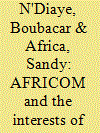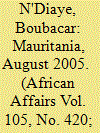| Srl | Item |
| 1 |
ID:
087322


|
|
|
| 2 |
ID:
072838


|
|
|
|
|
| Publication |
2006.
|
| Summary/Abstract |
A military coup abruptly ended Ould Taya's authoritarian regime in Mauritania, one of the longest-running regimes in West Africa. The bloodless coup broke a dangerous political impasse and stopped what seemed to be a slide towards breakdown and violence. Using the democratization literature, this article explains its root causes and evaluates the prospects for the establishment of a genuine democracy after two decades of a repressive military and then quasi-military regime. It argues that several variables combined to seal the regime's fate. These are essentially the deeply flawed, tribally based, make-believe democracy, Ould Taya's own troubled personality, and finally, the security apparatus's withdrawal of its backing. The article also argues that the new military junta's first decisions appear encouraging enough but that its determination to keep a tight control over the transition process and avoid the fundamental aspects of Mauritania's malaise may jeopardize genuine long-term democratization.
|
|
|
|
|
|
|
|
|
|
|
|
|
|
|
|
| 3 |
ID:
089475


|
|
|
|
|
| Publication |
2009.
|
| Summary/Abstract |
The 3 August 2005 military coup was Mauritania's best opportunity to turn the page on decades of the deposed quasi-military regime's destructive politics. This article critically analyses relevant aspects of the transition that ensued in the context of the prevailing models of military withdrawal from politics in Africa. It also examines the challenges that Mauritania's short-lived Third Republic faced. It argues that the transition process did not escape the well-known African military junta leader's proclivity to manipulate transitions to fulfil suddenly awakened self-seeking political ambitions, in violation of solemn promises. While there was no old-fashioned ballot stuffing to decide electoral outcomes, Mauritania's junta leader and his lieutenants spared no effort to keep the military very much involved in politics, and to perpetuate a strong sense of entitlement to political power. Originally designed as an ingenious 'delayed self-succession' of sorts, in the end, another coup aborted Mauritania's democratisation process and threw its institutions in a tailspin. This only exacerbated the challenges that have saddled Mauritania's political system and society for decades - unhealthy civil-military relations, a dismal 'human rights deficit', terrorism, and a neo-patrimonial, disastrously mismanaged economy.
|
|
|
|
|
|
|
|
|
|
|
|
|
|
|
|